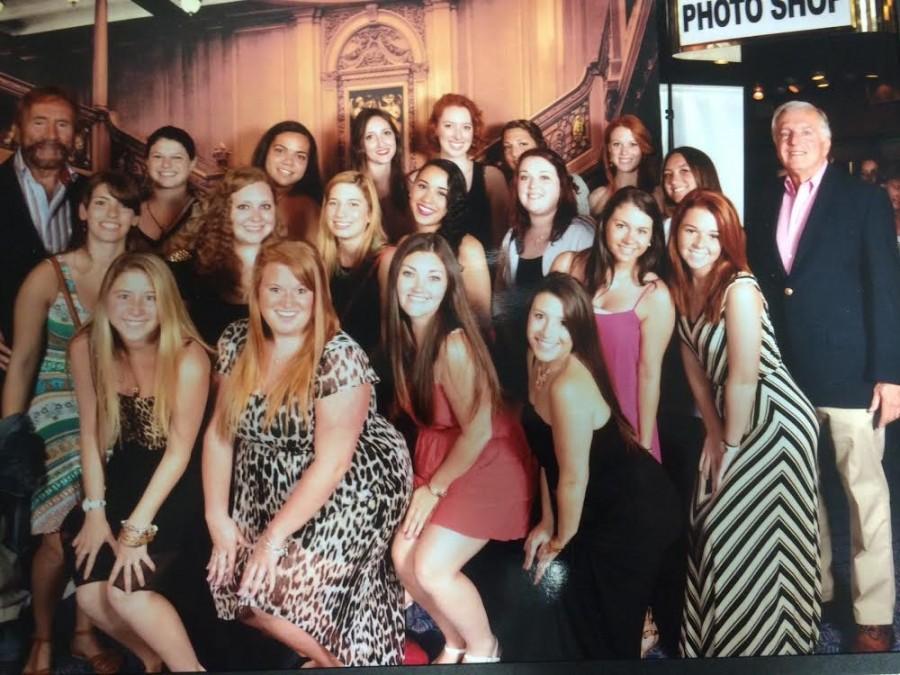33 Years in Greece and Counting
Dr. Nicholas Catalano’s renowned travel course “Greece: A Modern Odyssey” marked its 33 anniversary this past summer, making it the longest running travel course in the United States.
This interdisciplinary course, which includes archaeology to zoology and a lot in between, aims to reference all the academic disciplines that have a meaning to classical Greece.
Joined by Dr. Joseph Pastore, and a group of what turned out to be all girls this year, the 11-day modern odyssey began.
“This course is orchestrated so that the students can search within themselves and see a huge socio-psychological transformation,” said Catalano, now in his 50 year teaching at Pace.
The trip starts off with a weekend in Athens, where the students arrive at the Eleftherios Venizelos International Airport and instantly step into a country with thousands of years of history, culture, life, art, architecture, and cuisine to offer. This weekend gives students the opportunity to see the city at the center of the Golden Age, visit the Parthenon and the Acropolis, explore Plaka to take in the Hellenic culture, and check out the new Parthenon Museum.
“We try to recreate the life of a classical Greek,” Catalano said. “They lived an incredible cultural life; they celebrated, played sports, flooded the agora, explored logic, reasoning, democracy, and so much more.”
The weekend concludes outside of the city, where the students have the opportunity to visit Sounion, enjoy the Temple of Poseidon, as well as the beach and, according to Dr. Catalano, the freshest seafood they’ll ever taste.
Then, Monday, the students board the Louis Cruise Line ship for some of Greece’s famed islands. The first stop is Mykonos with its famous windmills, and a glimpse of Greek island culture and nightlife. The next day, the students visit Ephesus, in Turkey, which contains the remains of an ancient Greco-Roman city dating back to 800 B.C., which served as a major trading center until it was abandoned in 350 A.D. From there, the students arrive in Patmos, the small island where it is believed St. John wrote the Book of Revelation. Wednesday brings the students in Rhodes for the day, where they have the opportunity to rent motorbikes on their way to the beach.
The voyagers then head to Crete, where Dr. Catalano “tries to capture the essence of Minoan culture” with a visit to the Palace of Knossos, and then off to Santorini, where the students traditionally take donkeys up the mountain and learn about its mythical connection to Atlantis. This year, much to the dismay of the group, the cruise ship was unable to dock in Santorini and had to continue its course.
The final weekend concludes in Mycanae and Epidauros, ending the course in Nauplion, a Greek port city in the south, before the return.
“As the course ends, the students become so embroiled in the fact that there is an alternate lifestyle outside of the U.S.,” Catalano said. “They become Greek; they become believers in the high standards of existence in Greece and develop a whole new perspective of a life to be celebrated.”
Dr. Catalano, who has spoken in front of both the Greek and Cypriot Parliaments on a number of occasions, has spent decades studying Greek history and culture, and even filming documentaries, including ones aired on the Discovery Channel. He tries to share with his students, year after year, just how much this European country has influenced the world.
“Although in recent years, Greece has experienced a lot of negative publicity and troubles, the Greeks are still a very strong and cultured people,” Catalano said. “This country has had such an impact on the international world, from the philosophy of Socrates, to the mathematics of Euclid, to Alexander’s quest to ‘Grecify’ the world and the development of democracies all over-there’s no other place like it.”
Catalano urges the student body to join him on his 34 modern odyssey, and explore what the cradle of civilization is all about, from its ancient history to the present culture. Students are encouraged to register early, as historically this course has closed quickly.
For more information, students can contact Dr. Catalano at ncatalano@pace.edu.
Your donation supports independent, student-run journalism at Pace University. Support the Pace Chronicle to help cover publishing costs.

